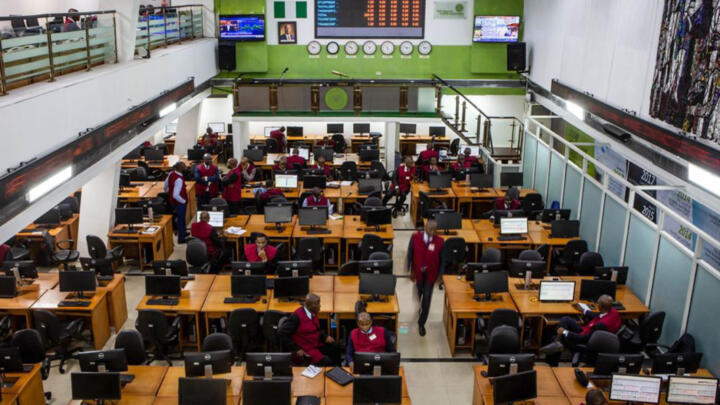The Nigerian Exchange Limited experienced sustained bearish sentiments for the second consecutive day as the market reacted to the recent judgment by the Supreme Court regarding the 2023 general elections cases. This development led to a loss of N67 billion off the market capitalization, creating a significant impact on the local bourse. These events have captured the attention of investors and market analysts, highlighting the volatility of the financial market.
The decline in market capitalization can be attributed to a depreciation in the share values of several key companies. Some of the notable entities that contributed to this downturn include MTN Nigeria, which recorded a 0.40 percent decrease, Flour Mills with a substantial 3.23 percent decrease, Stanbic IBTC at 3.21 percent, Computer Warehouse Group with a significant drop of 9.94 percent, Fidelity Bank down by 1.82 percent, and 24 other companies that experienced similar share value declines.
The negative performance of these significant market players played a substantial role in the overall market’s performance on this particular trading day.

The catalyst for this bearish sentiment in the Nigerian financial market was the Supreme Court’s affirmation of the decision made by the Presidential Election Petition Tribunal. The tribunal had previously upheld the victory of President Bola Tinubu in the February 2023 election. This decision had far-reaching implications, as it influenced investor confidence and created a ripple effect across the market. The uncertainty and potential for political instability in the wake of this judgment added to the negative sentiment that prevailed on the Nigerian Exchange Limited.
The All-Share index, which is a key indicator of the overall performance of the market, saw a dip of -0.18 percent when compared to the previous day’s decline of -0.02 percent. The index closed the trading day at 67,084.95 points, while the market capitalization settled at N36.856 trillion. The decline in these indicators underscored the impact of the Supreme Court’s decision on the market.
Market Breadth, which measures investors’ sentiments, was notably negative at 0.41x, reflecting the bearish mood that prevailed. This was in stark contrast to the previous market breadth of 1.28x, which had shown a more optimistic sentiment. On this trading day, 29 stocks experienced depreciation, while only 12 stocks recorded gains. The lopsided performance of stocks further emphasized the negative investor sentiment in the market.
Transaction volume also witnessed a decline, moving from 329.66 million to 267.65 million units of shares valued at N5.1 billion, traded across 5,205 deals. The number of stocks that traded during the day’s session stood at 117, indicating that investors were cautious and selective in their trading activities, likely due to the prevailing market conditions.
The negative sentiment was widespread across different sectors of the market. Two out of the five sectors closed in the red, two remained relatively muted, and only one sector experienced gains. The Banking and Insurance sectors suffered the most significant setbacks, with declines of 0.33 percent and 1.82 percent, respectively. This was driven by sell-offs in stocks of financial institutions like Stanbic, Prestige, Cornerstone Insurance, GTCO, and Zenith Bank. However, the Consumer Goods sector managed to record a slight growth of 0.12 percent, thanks to the positive performance of Nestle and Transcorp. In contrast, the Industrial Goods and Oil & Gas sectors exhibited subdued performances, reflecting the overall bearish market sentiment.
Despite the overall negative sentiment, some stocks managed to buck the trend and recorded gains by the close of Thursday’s trading session. McNichols, for instance, saw its shares appreciate by 8.93 percent, closing at N0.61. Oando gained 4.07 percent to close at N8.95, UAC Nigeria’s shares increased by 6.09 percent to close at N12.20, and Chams gained 3.65 percent to close at N1.99. Nestle and Transcorp also recorded gains of 2.94 percent and 2.75 percent, closing at N1,050 and N6.35 per unit, respectively. These performances amidst the overall market decline indicate the presence of trading opportunities for astute investors who can identify and capitalize on individual stock movements.
The volume and value drivers of the day’s trading were primarily led by stocks of Fidelity, Chams, Nestle, AccessCorp, UBA, and Stanbic. These stocks played a significant role in shaping the trading activities for the day, underlining their importance in the overall market dynamics.
In conclusion, the Nigerian financial market experienced sustained bearish sentiments due to the Supreme Court’s recent judgment on the 2023 general elections cases. The negative impact of this judgment was felt across various sectors and led to a decline in market capitalization, as well as negative market breadth. While the market as a whole experienced a downturn, some individual stocks managed to record gains, indicating that there are still opportunities for traders and investors, even in a challenging market environment. As the market continues to react to political and economic developments, it remains essential for participants to stay informed and exercise caution in their investment decisions.
Support InfoStride News' Credible Journalism: Only credible journalism can guarantee a fair, accountable and transparent society, including democracy and government. It involves a lot of efforts and money. We need your support. Click here to Donate
